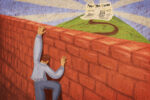“I hate adulting.” How many times do you hear that each day, month or year? This is a common phrase among college students as we navigate our newfound adulthood and all the responsibilities that come with it. As most people know, adulthood isn’t just defined by freedom, drinking and eating ice cream for breakfast; it’s littered with bills, taxes and real consequences.
Until now, most generations had grimly accepted this fact of life, shrugging their shoulders and telling you just that. There was no complaining, just “sucking it up.” This has all changed with millennials and Gen Z — who now refer to the responsibilities that come with adulthood as “adulting.”
There are books filled with steps on how to “adult,” now a verb as well as a noun. With how commonplace the word is and its generally negative connotation, are their implications to this? While we can say that it’s just a word used by younger generations to express their frustration over becoming mature adults, words have meaning and directly impact our well-being.
While this doesn’t mean that we can’t express our feelings in a healthy way, it does mean that it’s important to consider which words we are using and how that might directly impact our behaviors and attitudes toward specific activities.
For example, constantly expressing that you hate going to work might actually make you dislike going to work more than if you would approach it with even a neutral attitude. Likewise, approaching normal adulthood responsibilities with a negative attitude, while valid, could make them seem even worse than they are.
Don’t get me wrong: Nobody likes paying bills. Nobody enjoys the panic that comes when they don’t know how they’re going to make rent or paying exorbitant amounts for health insurance. There is something to be said, though, for approaching these difficult situations with a general state of awareness — awareness that while these situations are stressful, they will probably work out in the end.
Mental health isn’t the only factor to consider when it comes to “adulting.” It can also impact your image, especially among people you admire. Many older adults (in this case, those who are not in their 20s) look down on the term and those who use it. While this may seem weird and unfair (it’s only a word, right?), it’s not totally unfounded.
Their arguments tend to hover around the idea that “adulting” is the same as existing. Once you reach a certain point in your life, you are an adult and that’s not something to complain about, but rather, something to accept and embrace for all that it entails, the good and the bad.
This is the same for all age groups. Sure, as a kid you might have expressed that you don’t like certain parts about that role but for the most part, you accepted it. You took it for what it was and made the most of it because that’s all you knew how to do. You played and ate your vegetables, probably driving your parents crazy but nevertheless enjoying yourself.
Even as a teenager, while there was definitely a part in all of us that wanted to grow up and move out, we all accepted that we were teenagers and made the most of it. We didn’t constantly complain about it, but understood that it was going to be a few years before we could do all the things we wanted to and lived in the present moment. So, we went to prom and attended homecoming football games.
Even older people are this way. You might hear your parents and grandparents complaining about certain things (like aches and pains) but for the most part, they understand that they are in that stage of life and there’s nothing they can do about it. So, they chug on like “The Little Engine That Could” until life throws another curveball at them.
This is all any of us can do. We can’t control the fact that we are growing older — that’s just part of life and growing up. Just think, this is what you dreamed of when you were younger. You dreamed of moving out, getting an apartment, whipping up fancy meals in your own kitchen and having friends over for movie nights and dinner parties.
While reality might not be as great as the fantasy was, you can still whip up fancy meals and host your friends. You can drink a glass of wine while watching TV and take road trips across the country and eat ice cream for breakfast if you want. You can buy that cereal that you always wanted to try but your mom would never give in and get it for you.
Adulthood is a whole new world. It’s hard and frustrating and stressful but it’s also filled with possibility. Possibility that even if right now isn’t a stable time for you, maybe in a month or a year that will change.
https://www.instagram.com/p/B7mmivQAzSo/?utm_source=ig_web_copy_link
As a kid, you had to succumb to the whims of your parents but as an adult you get to create your own rules (to a certain extent, follow the law please). If you have extra time and money and want to learn to rock climb, you can take a class. If you don’t have extra money but want some, you can pick up another job. There are endless ways to cultivate possibilities for yourself with enough thought and effort.
For that reason alone, maybe we should stop using “adulting” to define our existence as adults. We’re selling ourselves short in a big way without even knowing it, leaning in to the belief that we don’t have what it takes to be successful adults and eternally living in our heads as teenagers.
That isn’t any way to live. We should be celebrating our successes, coming together during our struggles and embracing the next good thing in our paths because at this point, adulthood is our only option.

















